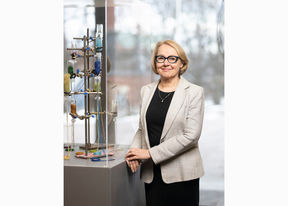Nature invented the circular economy — with aspirational engineering we can follow suit

Kristiina Kruus, Dean of the Aalto University School of Chemical Engineering:
"In my research career I’ve focused on how enzymes and microbes break down biomass. Nature’s microbes can decompose plant-based biomass, like wood, into sugars, which pass up the food chain into animals. In this magnificent circular economy, everything is utilised and there is no waste, unlike in many industrial processes. Aspirational engineering is a new way of thinking that seeks to emulate nature’s rational use of resources.
I’m completely convinced that technological development will find solutions for the climate crisis, the loss of biodiversity and the shortage of raw materials. This massive transition is already underway: electric vehicles are taking over, single-use consumption is decreasing, and we are learning to make sustainable choices.
I am particularly encouraged that chemical engineering, which has been seen as a polluting promoter of heavy industry, is now attractive to young people at the same time as the field strives for clean solutions. We are educating the students who will make and apply the aspirational engineering of the future. An example is green hydrogen, which can be produced with Finnish wind energy and used to make, for instance, fertilisers and chemicals, free of emissions.
As a bioengineer, it is amazing to see how renewable biomaterials are now replacing fossil-based packaging like plastic. In addition to replacement, recycling of materials like textiles, fibres and metals is another important way to protect nature. But single-use consumption needs to be cut back, because stopping waste from being created in the first place is the most effective action. Technology can play a role here too, because with judicious and systematic use of raw materials and longer-lasting products, we can reduce waste and promote recycling.
The green transition is happening, and I am convinced that, with the help of technology, we can reach carbon-neutrality by 2035, Finland’s goal year."
This story first appeared in the Aalto University Magazine issue 32, which was published in April 2023. The digital version can be read on the issuu.com website.
Read more news

Significant donation to boost pavement engineering research and education
Companies and associations in the field have donated €400,000 to the School of Engineering.
‘Mesoscale’ swimmers could pave way for drug delivery robots inside the body
Researchers have discovered how tiny organisms break the laws of physics to swim faster — such secrets of mesoscale physics and fluid dynamics can offer entirely new pathways for engineering and medicine.
Design strengthens industrial competitiveness – human-centered factory work at the core
Factory work is undergoing a transformation: new technologies and artificial intelligence are changing the content and roles of work. Aalto University’s Department of Design is studying this change from a human-centered perspective in the HiFive project.






